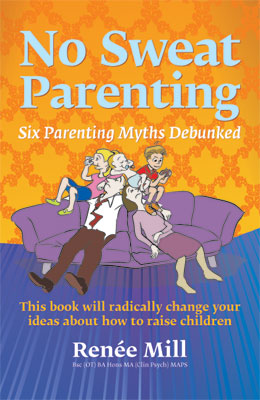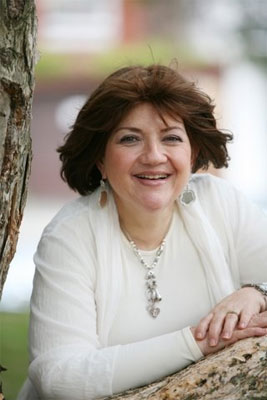Angry Parents

Angry Parents
Author, child-raising expert and practising clinical psychologist, Renee Mill says rage amongst parents has become a major concern of the current generation of parents.
Through her clinical practice and subsequent research, Renee Mill said has discovered, "More and more parents are distressed because they feel their anger towards their children is frequently out of control or chronic. They feel alone in their problem and ashamed. They often don't realise how common rage is amongst parents. It's important to them they stop but don't know how."
In addition to her own patients and theoretical research, Renee Mill confirmed the popularity of the subject recently by extraordinarily high attendance rates at a series of her community-based parenting talks. "My regular appearances usually draw reasonable attendance, but the Rage in Parenting talks were noticeably full."
No Sweat Parenting
Renée Mill has written a book for parents who are tired. Tired of living up to unrealistic expectations; tired of second-guessing their own authority; tired of making excuses as to why they can't play games; tired of pretending that their responsibilities and wants don't exist; and tired of buying stuff.
Parenting has become exhausting. Yet, it need not be.
No Sweat Parenting provides insight into six beliefs that, after 30 years of practicing psychology, Renée has identified as the centre of current parenting behaviours.
The book was written to help change the way mums and dads think of themselves, their styles of parenting and the unrealistic expectations they assume. It gives parents some alternatives in order to feel reenergised and empowered and to foster the best possible emotional and social wellbeing for their children.
Through her clinical practice and subsequent research, Mill said has discovered, "More and more parents are distressed because they feel their anger towards their children is frequently out of control or chronic. They feel alone in their problem and ashamed. They often don't realise how common rage is amongst parents. It's important to them they stop but don't know how."
In addition to her own patients and theoretical research, Mill confirmed the popularity of the subject recently by extraordinarily high attendance rates at a series of her community-based parenting talks. "My regular appearances usually draw reasonable attendance, but the Rage in Parenting talks were noticeably full."
Renée Mill challenges the following beliefs:
1.I must be the perfect parent.
2.If I am firm my child will have low self-esteem.
3.Quality time means playing with my child.
4.Parenting and adult life have to be conducted separately.
5.Material benefits bring happiness.
6.I must do everything for my child so that he will feel good about himself and feel safe in the world.
Easy to read, parents will benefit from Mill's expert advice and heart-felt understanding of the concerns of modern parents. All points are illustrated with cartoons and real life stories from Renée Mill's psychology practice. She also gives practical exercises for parents to instigate immediate change.

Interview iwth Renee Mill
Is rage really that big of a problem?
Renee Mill: Huge. Every parent loses it at some time, but because of stress and low tolerance parents are losing it more often and with greater intensity.
What is it that causes the angriness of parents? Is it always the children?
Renee Mill: Children do not cause rage. A parents interpretation of their child's behaviour causes rage. So parents often take things personally "If he respected me he would not leave a mess" or see things catastrophically "This room looks like a hurricane hit it". Children are children they all make mess and are oppositional but rage is not the solution.
If it isn't always children, do they normally receive the after affect of anger?
Renee Mill: No doubt, if mum is stressed her fuse is shorter. If dad is exhausted he has poorer control and the children cop it often undeservedly.
How does having an angry parent or parents affect a child?
Renee Mill: The main thing it causes is fear and uncertainty because the child never knows when the parent will lash out. It also leaves a child bewildered because the child has been told they are bad but not how to correct the behaviour. Frequent insults and criticisms and unrealistic expectations will lower self esteem.
What can parents do to ensure they don't take their anger out on their children?
Renee Mill: 1. take responsibility for anger as opposed to blaming the child
2. Relax every day and visualise themselves reacting calmly to a mess or mishap
3. Learn anger management strategies
5. Not to sweat the small stuff
6. Develop strategies to teach a child the desired behaviour.
Why has rage become one of the biggest concern for this generations Mum and Dads?
Renee Mill: Rage has become a problem for everyone in our generation, road rage, violence, abuse etc... However, mums and dads are aware they are the protectors of their children and being angry is destructive to their child's self esteem and to the relationship.
Renee Millhas been working with people since 1974, first as an occupational therapist and then as a clinical psychologist. Over the years she has counselled hundreds of families and individuals and continues to work full time in her own private practice in Sydney with her team of associates to deliver effective counselling to parents and children. Renée has been married for 27 years and has four children.
Mill's first book, No Sweat Parenting identified fatigue as the number one complaint of parents with young children and debunked six common myths that are at the centre of current parenting behaviours. Her second book is due to be published in 2009.
No Sweat Parenting
Author: Renée Mill
ISBN: 978-0-9805859-0-2
Price: $24.95
Interview by Brooke Hunter
MORE



